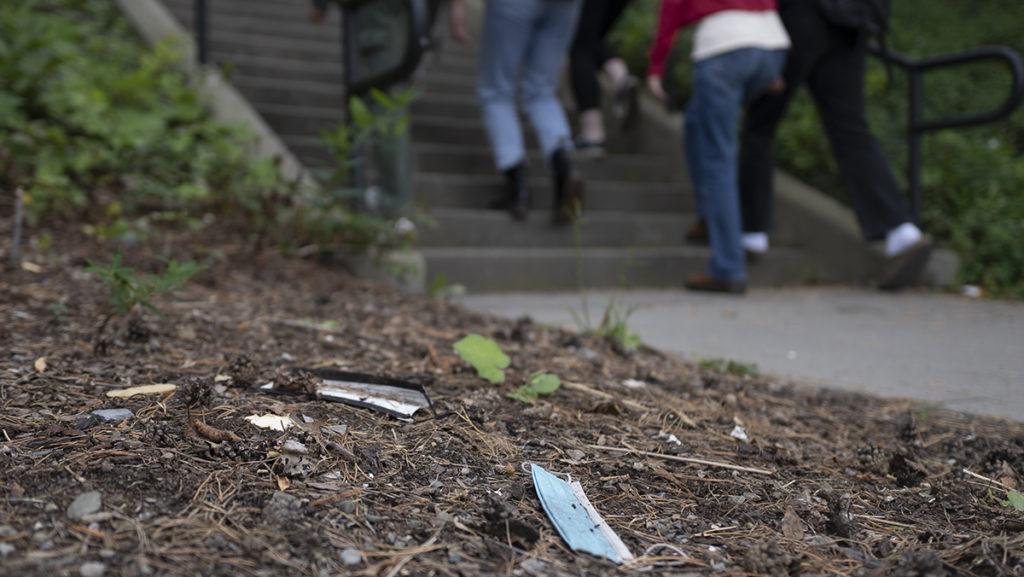All around the Ithaca College campus, disposable masks are flattened to the ground, soggy with rain; wrappers are tangled in bushes and plastic cups lay tipped on their sides, attracting insects. As the fall semester at the college progresses, students, staff and faculty have expressed their concerns about the increased amount of trash strewn across campus.
Some students have noticed that certain areas of the campus have more trash than others. One of the areas is the outside of the Campus Center, where some students choose to eat or spend time on the quad. A primary source of concern is the number of disposable face masks and coverings that have been left on the ground on campus. The college requires all members of the campus community to wear a face covering when indoors, but vaccinated individuals do not have to wear a mask when outdoors.
Tim Carey, associate vice president of the Office of Facilities, said he was concerned about the increased amount of trash.
“To this point of the semester, there has been a discernible increase in the amount of litter on campus when juxtaposed to previous years,” Carey said via email. “It is obvious that the most prevalent form of litter is the number of face coverings that can be found scattered across the campus grounds on a daily basis.”
He said the Grounds team, which is responsible for maintaining and enhancing the area of the ground of the central campus and off-campus location, is doing its best to address this issue by focusing on litter pickup on Monday and Friday mornings, because it is a time-consuming task that simply cannot be executed every day of the week.
Carey said in order to make things easier for the Grounds team, a few temporary trash totes have been placed in some areas outdoors where abundant numbers of masks were found piled on the ground.
“The campus has never experienced a situation in which litter has been strewn at the rate we are seeing,” he said via email. “As the semester continues, we are hopeful that all members of the college community will recognize the important role they play in helping to keep our campus clean and litter-free.”
Freshman Devon Jezek said one of the reasons she came to the college is because she was told that it was a green school. Jezek said she is surprised by how much trash has been accumulated in the span of a semester.
“The school should communicate the importance of recycling,” Jezek said. “ We should work more as a community because maintenance is lacking [staff].”
The college has been experiencing understaffing issues during the fall semester in many different departments and offices as a result of the national labor shortage.
According to the Princeton Review, the college was named as one of the most environmentally sustainable colleges. The guide featured 416 schools, which were selected based on a survey of administrators at 695 colleges.The administrators were asked about their institution’s sustainability-related policies, practices and programs. The college was given a Green Rating of 98/99, with the guide citing the college’s sustainability initiatives and a Gold Star rating from the Association for the Advancement of Sustainability in Higher Education (AASHE).
Sophomore Angela Russell, project coordinator for Eco Reps, said the excessive trash on campus is concerning and she hopes that the campus is taking more steps towards zero waste. Eco Reps is a student organization that is employed by the Office of Energy, Management and Sustainability that seeks to educate, empower and engage students, faculty and staff at the college. Eco Reps aims to teach students about the importance of recycling and about issues with climate change.
Eco Reps has created Take It Or Leave It (TIOLI). TIOLI is a resource for students to donate or shop for dorm essentials, school supplies and other common college student needs and is located in the basement of Clark Hall.
In 2019, the campus store began phasing out its usage of plastic bags, after former New York Gov. Andrew Cuomo signed a law banning plastic bags from the state.
In 2018, the college stopped purchasing plastic, single-use straws for its on-campus retail locations, replacing them with compostable ones.
“Eco Reps has consistently been leading conversations with the administration about making IC a more eco-friendly campus,” Russell said via email. “Students can help by simply participating in any way they can. If you live in Circles [Apartments] or Gardens [Apartments], composting is easy and accessible. Students can also help through just simple education and curiosity. There are a lot of people who don’t know how to recycle … and that’s a simple first step towards sustainability.”
Sophomore Keenan Griebel said it is ironic that the college is a green campus when there is a lack of recycling at the college. Griebel noted the use of single-use plastic utensils in the dining halls.
“Even though there’s trash everywhere, everyone is collectively ignoring it,” Griebel said. “Ithaca is a beautiful place and we live on a beautiful campus, and it’s sad to see it be so mistreated.”








